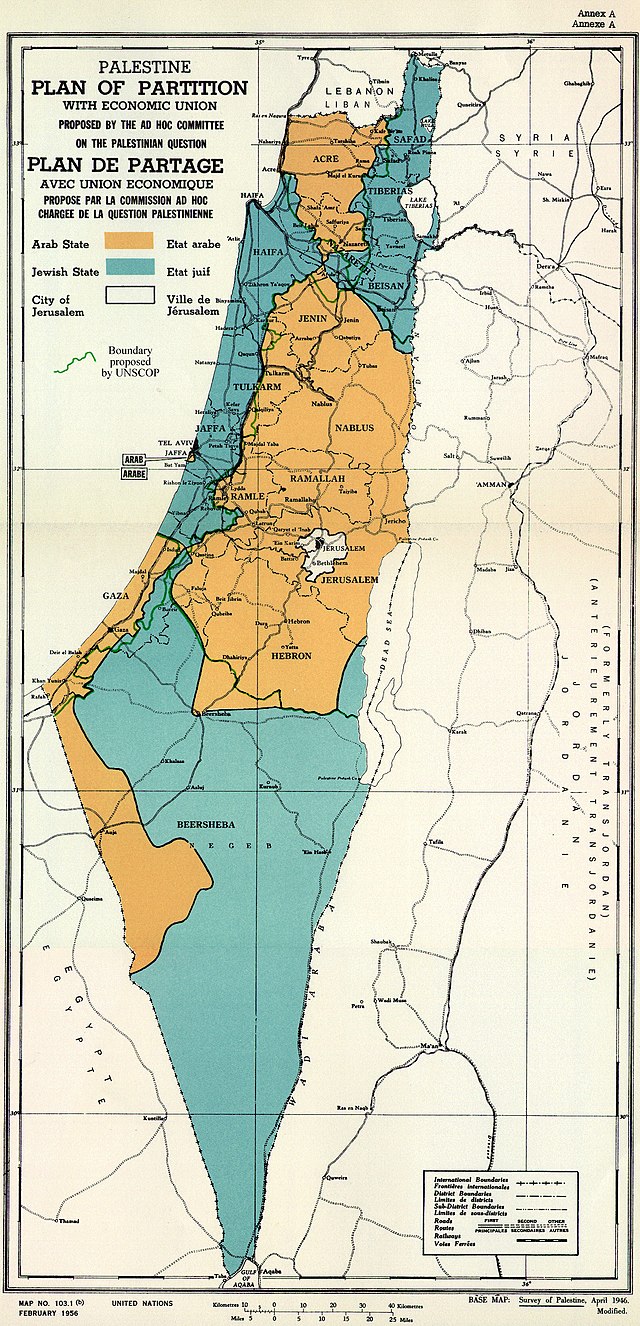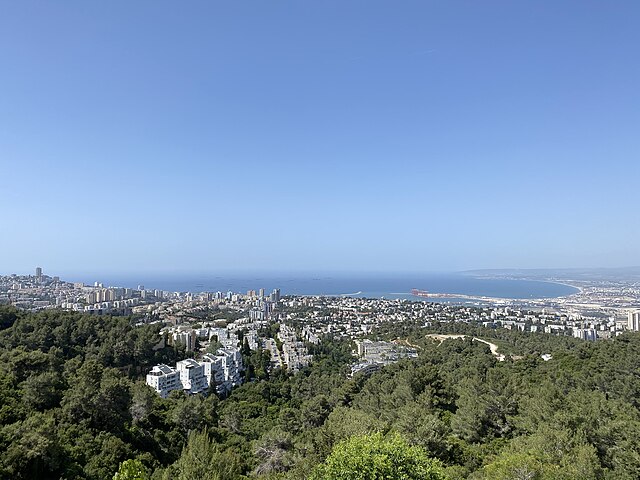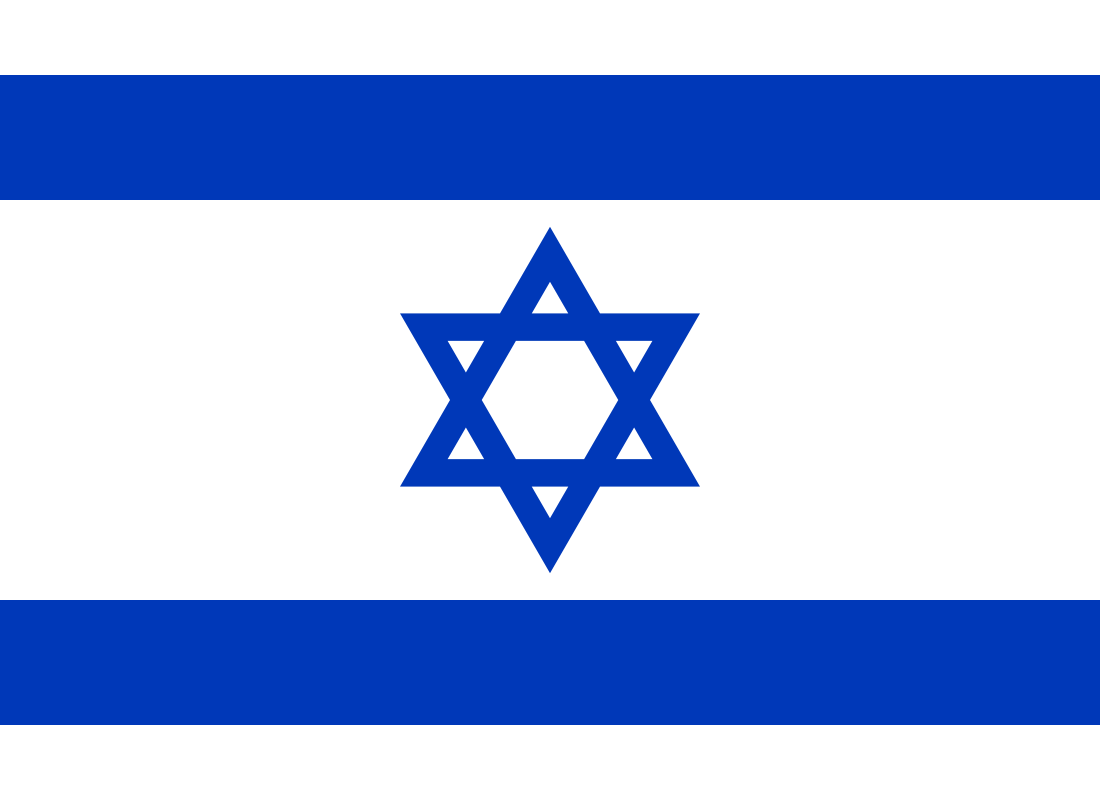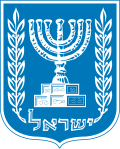Israel
country in West Asia From Wikipedia, the free encyclopedia
Remove ads
Israel (Hebrew: יִשְׂרָאֵל), officially the State of Israel (Hebrew: מְדִינַת יִשְׂרָאֵל), is a country in southwestern Asia on the eastern side of the Mediterranean Sea. Its capital city is Jerusalem.[19]
Israel's population is around 9.8 million people. This includes around 7 million Jews. Most of Israel's other citizens (1.2 million) are Arabs and include Muslims, Christians, and Druze.[20][21][22] Israel is approximately 470 kilometers (290 miles) long and 135 kilometers (85 miles) wide at its widest point, making it a relatively small country in terms of land area.[23]
There is a long history of conflict between Israel and Palestine. Many human rights organizations classify Israel as an apartheid state due to its policies against Palestinians in the West Bank and Gaza.[24]
Israel has a relatively high standard of living and life expectancy. Almost all of its people can read and write.
According to the The Economist's Democracy Index, Israel is the only democratic republic in the Middle East.
Remove ads
History
Israel's history begins thousands of years ago, in ancient times. Two major world religions, Judaism and Christianity, began here. The Jewish nation and religion first grew in this region.
Jews and Christians call Israel the Holy Land because many events described in the Bible happened there, and because some commandments of Jewish law can be accomplished only on its soil.[25]
Before the Common Era (BCE)
Canaanites and other Semitic peoples first populated the area around four thousand years ago. According to the Bible, the first Jewish patriarch, Abraham, lived at this time.
Around 1400 BCE, another Semitic people called the Hebrews settled in Canaan under the leadership of Moses and Joshua. They were named the “Children of Israel” or “Israelites”, and were divided into 12 tribes.
A few centuries later, the Hebrews made Saul their leader. The next king, David, began the Kingdom of Israel in about 1000 BCE and made Jerusalem its capital city. His son, Solomon, built the first Temple for the worship of their God.
Solomon died around 928 BCE, and his kingdom broke into two countries. The northern country kept the name Israel. The southern country, called Judah, kept Jerusalem as its capital.
The Assyrians conquered the Kingdom of Israel in 732 BCE. Then, in 586 BCE, the Babylonians conquered the Kingdom of Judah and destroyed Solomon's Temple. In response, many Jews returned from Babylonia to rebuild their country and their temple.
First the Persians, then the Greeks, and then the Romans ruled the Land of Israel.
During the early Common Era (CE)
Early in the first century, Roman soldiers defeated the Jews in modern-day Israel. In 70 CE, they destroyed Jerusalem and the Second Jewish Temple there. Again in 135 CE, the Romans defeated the Jews and killed or took many of them to other places.
The number of Jews living in Israel became much smaller. Many were forced to live in other countries. This spreading of Jewish communities outside of Israel is called the Diaspora.
Many of the Jews who remained moved to the Galilee. Jewish teachers wrote important Jewish books, called the Mishnah and part of the Talmud there, in the 2nd to 4th centuries CE.
The Roman and then the Byzantine Empires ruled until 635 CE, when Arabs conquered the region. Different Arab rulers, and for a while Crusaders, ruled the land. In 1516, the Ottoman Empire conquered the land and ruled the region until the 20th century.
The name "Palestine" is the English version of the Romans' name for the area, which was Syria Palaestina. This name in turn was derived from that of the Philistines, one of ancient Israel's historical enemies.[26][27]
During the modern Common Era
Since the Diaspora, there have been many attempts to make a new homeland for the Jewish people. Starting in 1860, the Zionist movement advocated for the creation of a Jewish nation in Israel. Jews from all over the world began to come to the area and settled in desert zones. These zones were first governed by the Ottoman Empire, and later by the British Empire.

On 14 May 1948, British control over Palestine ended. Jews living in Palestine (under the leadership of David Ben-Gurion) declared independence for a new Jewish state.[28] On the next day, the armies of four Arab countries—Egypt, Syria, Transjordan, and Iraq—invaded the territory of Israel and the former Mandatory Palestine, starting the 1948 Arab–Israeli War.[29] Military units from Yemen, Morocco, Saudi Arabia, and Sudan would also join the war.[30][31] The purpose of the invasion was to prevent the establishment of the Jewish state.[32][33][34][35] The Arab League stated the invasion was to restore order and prevent further bloodshed.[36] After a year of fighting, a ceasefire was declared and temporary borders, known as the Green Line, were established.[37] Jordan annexed what became known as the West Bank, including East Jerusalem, and Egypt occupied the Gaza Strip.[38][39]
The UN estimated that more than 700,000 Palestinians had left during the war, with many of them forced to leave. This became known as the Nakba ("catastrophe").[40][41] At the same time, over 900,000 Jews left the Arab states, with many of them also being forced to leave.[42]
In 1956, Israel, Britain, and France invaded the Sinai Peninsula, in an attempt to overthrow Egyptian president Gamal Abdel Nasser, and to retake the Suez Canal (for Britain and France). However, strong diplomatic pressure from the United States and the Soviet Union forced them to withdraw.

In May 1967, Egypt sent its army near the border with Israel, expelled UN peacekeepers that had been in the Sinai Peninsula since 1957, and blocked Israel's access to the Red Sea.[43][44][45] Other Arab states also prepared their armies.[46] Israel reiterated that these actions were a casus belli, and fearing another all-out invasion by their Arab neighbors, launched a pre-emptive strike against Egypt on 5 June. Shortly after, Jordan, Syria, and Iraq attacked Israel. In the following Six-Day War, Israel captured the West Bank from Jordan, the Gaza Strip and Sinai Peninsula from Egypt, and the Golan Heights from Syria.[47] Israeli forces expelled ~300,000 Palestinians from the Gaza Strip and the West Bank. Jerusalem's boundaries were increased, incorporating East Jerusalem. The 1949 Green Line became the administrative boundary between Israel and the occupied territories.[48]
Following the 1967 war and the "Three Nos" resolution of the Arab League, Israel faced attacks from the Egyptians in the Sinai Peninsula during the 1967–1970 War of Attrition, and from Palestinian groups targeting Israelis in their occupied territories, globally, and in Israel itself. The most prominent among the Palestinian and Arab militant groups was the Palestine Liberation Organisation (PLO), established in 1964, which initially committed itself to "armed struggle as the only way to liberate the homeland".[49] In the late 1960s and early 1970s, Palestinian groups launched attacks[50][51] against Israeli and Jewish targets around the world,[52] including a massacre of Israeli athletes at the 1972 Summer Olympics in Munich. The Israeli government responded with an assassination campaign against the organisers of the massacre, a bombing and a raid on the PLO headquarters in Lebanon.
On 6 October 1973, the Egyptian and Syrian armies launched a surprise attack against Israeli forces in the Sinai Peninsula and Golan Heights, opening the Yom Kippur War. The war ended on 25 October, with Israel repelling Egyptian and Syrian forces but suffering great losses.[53]
In 1978, Egyptian President Anwar Sadat and Israeli Prime Minister Menachem Begin signed the Camp David Accords. The next year, in 1979, they signed the Egypt–Israel peace treaty.[54] In return, Israel withdrew from the Sinai Peninsula and agreed to enter negotiations over autonomy for Palestinians in the West Bank and the Gaza Strip.[54] This was the first peace treaty between Israel and an Arab state. 15 years later, in 1994, the Israel–Jordan peace treaty was signed, making Jordan the second Arab country to normalize relations with Israel.[55]
In early 1979, the Iranian Revolution saw the overthrow of Mohammad Reza Pahlavi, the Shah of Iran, and the replacement of Iran's government with a hostile, extremist Islamism regime, which became an enemy of both Israel and the the West, beginning the Iran–Israel proxy conflict.
Since the 1980s, Israel has waged several wars in Lebanon to fight against the PLO and later, Hezbollah, beginning with the 1982 Lebanon War, and mostly recently, the Israel–Hezbollah conflict (2023–present). However, there a number of atrocities committed against the civilian population, with the most notable incident of this being the Sabra and Shatila massacre.[56] In 2000, Israel withdrew from Lebanon. Subsequently, Israel fought two more wars against Hezbollah, one in in 2006, and another one since 2023.
In 2005, Israel withdrew from the Gaza Strip.[57] However, 2 years later, in 2007, the Hamas militant organization seized control of the territory from the Palestinian Fatah party, in a violent coup. Beginning in 2008, Hamas and Israel fought five separate wars, in 2008, 2012, 2024, 2021, and mostly recently, in 2023.
By the 2010s, increasing regional cooperation between Israel and Arab League countries had been established, with the countries drawn increasingly closer by shared security interests, and their concerns with Iran. In September 2020, this culminated in the signing of the Abraham Accords, with the United Arab Emirates, Bahrain, and Morocco all normalizing ties with Israel, marking the first peace agreement between Israel and an Arab state since 1994. Sudan also signed onto the Accords, but had not yet ratified it by 2025. The Israeli security situation shifted from the traditional Arab–Israeli conflict towards the Iran–Israel proxy conflict, and direct confrontation with Iran during the Syrian Civil War.
On 7 October 2023, over 6,800 Hamas terrorists invaded Israel and launched the October 7 attacks, massacring 1,915 Israelis (including 815 civilians), and taking 251 hostages, which started the 2023 Gaza War.[58][59][60] This war quickly expanded into a regional conflict, including a war with Hezbollah in Lebanon, a conflict involving attacks by the Houthis on Israel and on international shipping in the Red Sea, attacks by Iranian militia groups on US military bases in Iraq, Syria, and Jordan, and two rounds of attacks between Iran and Israel in April 2024 and October 2024. Hezbollah's defeat in Lebanon led to a massive offensive led by Hay'at Tahrir al-Sham (HTS) in Syria, restarting the Syrian Civil War after a 4-year pause, and leading to the Fall of the Assad regime on 8 December 2024.[61][62] In June 2025, the regional conflict culminated in a full-scale war between Israel and Iran, with Israel opening the war with large-scale surprise attacks on Iran's military leadership, top nuclear scientists, and nuclear program.[63][64][65] which later became known as the Twelve-Day War.[66][67] The war saw the entry of the United States on 22 June 2025, with a fleet of 14 B-2 bombers destroying 3 fortified nuclear sites in central Iran, in a massive airstrike.[68][69]
Remove ads
Geography


Israel is a small country, but it has mountains, deserts, shores, valleys and plains.
The countries of Lebanon and Syria are to the north of Israel; Jordan is on the east; and Egypt is to the southwest. Israel also occupies 60% of the Palestinian West Bank.
Jerusalem is the biggest city in Israel. It is also Israel's official capital city. However, most countries do not recognize this, because they believe Jerusalem should be split up or be under international control. Tel Aviv, Haifa, Beersheba and Rishon LeZion are also large cities.
Variations
Israel's geography varies from place to place.
In the west, Israel's long coastline meets the Mediterranean Sea. A coastal plain runs alongside this coastline.
To the north, Israel has a mountainous region called the Galilee. On the eastern side of the Galilee, there is a low area called a depression that includes the Hula Valley and the Sea of Galilee.
To the south, there is the Negev Desert: a barren area of flat plains, mountains, and craters. Israel's southern-most city is Eilat, which is located on the Gulf of Aqaba (a part of the Red Sea).
In the center of the country, there is a range of mountains that runs from north to south. The Jordan River also runs north to south, starting in the Sea of Galilee in the north and emptying into the Dead Sea in the south. The land next to the Dead Sea -426 meters below sea level: the lowest in the world.[70]
Remove ads
Climate
The climate is hot and rainless in the summers, with high humidity in lower places like the coastal plain. It is cool and rainy in the winters, rarely going below freezing temperatures. Rain falls mostly in the north, and mostly in the winter (between the months of November and April). Snow falls at higher elevations. While much of Israel has a Mediterranean climate, certain regions, such as the Golan Heights and Jerusalem, experience snowfall during the winter months.[71]
To make it possible for crops to grow in the south, Israel built a very big irrigation system to bring water to the area from the north.[70]
Government
National government

A parliamentary democracy
Israel is a parliamentary democracy. All Israeli citizens who are 18 years or older have the right to vote. The Israeli parliament is called the Knesset.
The Knesset has 120 members. Each member is elected for no more than four years at a time. The Knesset makes laws, helps decide national policy, and approves budgets and taxes. The current Knesset is the country's 25th, sworn in on November 15, 2022.
Israel has no written constitution. Instead, the "Basic Laws" made by the Knesset say how the government must work and give civil rights to the citizens.
Voting
Voters do not vote for individual candidates in Knesset elections. Instead, they vote for a party. Before the election, each party prepares a list of its candidates. The list might include a single candidate or over a hundred. Voters can see each party's list and decide which party they want to vote for.
In an election, each party wins a certain percentage of the votes. This percentage decides how many representatives, or seats, the party gets in the Knesset. For example, if a party list gets 33 percent of the vote, it gets 40 Knesset seats.
The Prime Minister
See the main article: Prime Minister of Israel
The head of Israel's government is the Prime Minister. They are usually the leader of the party that has the most seats in the Knesset. The prime minister must keep the support of a majority of Knesset members in order to stay in office.
The prime minister appoints ministers to the cabinet, which The Knesset approves. The ministers are responsible for subjects such as education, defense, and social welfare. The Prime Minister is the head of the cabinet; they decide what will be discussed at meetings, and they make the final decisions.
Benjamin Netanyahu has been the Israeli Prime Minister since December 29, 2022. The current government is called the Sixth Netanyahu Government because it was the sixth time Netanyahu has been elected.
The President
See the main article: President of Israel
The President is the head of state. The Knesset elects the president for seven years.
Most of the president's duties are ceremonial: they can sign laws and treaties approved by the Knesset, appoint judges, and choose members of some public organizations. They also accept the documents from ambassadors and foreign diplomats bring when they are appointed.
Isaac Herzog has been the President of Israel since July 2021.
Politics
Israel has many political parties, with a large variety of opinions. In the elections of 2020, 20 different parties won seats in the Knesset.
The parties belong to several main groups. The biggest groups are the Zionist parties. These include the conservative liberals (such as HaLikud[72]); social democrats (like HaAvoda, the Labor Party); and religious Zionists. There are also smaller religious Orthodox Jewish parties; special-interest parties; and Israeli Arab parties.
Usually, a single political party does not win enough seats in the Knesset by itself to have a majority. If this happens, one of the bigger parties asks for support from the other parties (including the religious ones) to form a coalition government. This gives these small parties a lot of power despite their size.
Likud vs. Labor
The Likud supports free market policies and does not think government should be involved much with the economy. It also believes strongly in protecting Israel's security. It wants Israel to make fewer concessions (to give less away) while negotiating with the Palestinians and the Arab states.
The Labor Party supports government control of the economy, but also believes in a limited amount of free enterprise. It is willing to make more concessions (to give more away) in order to reach an agreement in the peace process.
Remove ads
Economy
When it gained its independence in 1948, Israel was a poor country that produced very little agriculture or industry. But Israel's economy has grown tremendously since 1948. The nation now enjoys a very high standard of living, despite having few natural resources and a limited fresh water supply.
Many immigrants came to Israel in the years immediately after independence. Many of these immigrants were skilled laborers and professionals who greatly aided the nation's economic development.
Service industries
Many of Israel's service industry workers are employed by the government or by businesses owned by the government. Government workers provide many of the services needed by Israel's large immigrant population, such as housing, education, and job training.
Tourism
Tourism is one of the country's important sources of income. Tourists visit many archaeological, historical, and religious sites; museums; nature reserves; and beach resorts in Israel.[73]
Tourists support many of Israel's service industries, especially trade, restaurants, and hotels. Approximately 4 million tourists visited Israel in 2018.[74]
Manufacturing
Israeli factories produce such goods as:
- Chemical products
- Electronic equipment
- Fertilizer
- Paper and plastics
- Processed foods
- Scientific and optical instruments
- Textiles and clothing
Tel Aviv and Haifa are Israel's major manufacturing centers. Government-owned plants make equipment for Israel's large armed forces.
The cutting of imported diamonds is a major industry. Israel is also the world's largest exporter of drones.[75]
Agriculture

Israel produces most of the food it needs to feed its people, except for grain. Exporting agricultural products provides enough income to import needed foods. Israel's agricultural products include citrus and other fruits; eggs; grain; poultry; and vegetables.
The government develops, helps finance, and controls agricultural activity, including fishing and forestry.
Most Israeli farmers use modern agricultural methods. Machines now do much of the work that people used to do. Water drawn from the Sea of Galilee irrigates much of the land in Israel.
Most Israeli farms are organized as moshavim or kibbutzim. Israel also has some private farms.
Mining
Israel's biggest source of minerals is the Dead Sea, the world's saltiest body of water. Bromine, magnesium, potash and table salt are all extracted from the sea. The most important of these is potash, used mainly in fertilizers.
In the Negev Desert, there are mines for phosphates, copper, clay, and gypsum.
Energy

Israel has few energy sources. It has no coal deposits or hydroelectric power resources, and only small amounts of crude oil and natural gas. As a result, Israel depends on imported crude oil for gasoline and diesel for transportation, and coal producing electricity for its energy needs.
Solar energy – energy from the sun – is used widely to heat water for houses. Israel is developing other ways to use solar energy to power houses and factories.
In 2008, Israel began investing in building electric cars and stations to charge them. There may also be large natural gas fields in the Mediterranean Sea that Israel could develop.
International trade
In 2006, Israeli exports grew by 11% to just over $29 billion. The hi-tech sector accounted for $14 billion of this: a 20% increase from the previous year.
Because it has few natural resources, Israel imports more goods than it exports. The country's main imports include chemicals, computer equipment, grain, iron and steel, military equipment, petroleum products, rough diamonds, and textiles.
Israel's main exports are chemical products, citrus fruits, clothing, electronic equipment, fertilizers, polished diamonds, military equipment, and processed foods. The nation's main trading partners include the Benelux countries (Belgium, the Netherlands, and Luxembourg); Germany; Italy; Switzerland; the United Kingdom; and the United States.
Transportation

Israel has a well-developed transportation system. Most middle-class Israeli families either own a car or have one that an employer provides. Paved roads reach almost all parts of the country. Public transportation, both in cities and between them, is provided primarily by bus.
Ben-Gurion Airport is Israel's main international airport. It is near Tel Aviv. Smaller airports are located at Haifa and at Eilat. El Al, Israel's international airline, flies regularly to the United States, Europe, and parts of Asia.
Israel has three major deepwater ports: Haifa, Ashdod, and Eilat.
Communications
Israel's communication system is one of the best in the Middle East. Israel has about 30 daily newspapers, about half of which are in Hebrew. The rest are in Arabic, Russian, Yiddish, or one of several foreign languages. The Israel Broadcasting Authority, a public corporation set up by the government, runs the television and nonmilitary radio stations.
Remove ads
Related pages
Notes
- Disputed. Recognition by other UN member states: Australia (West Jerusalem),[1] Russia (West Jerusalem),[2] the Czech Republic (West Jerusalem),[3] Honduras,[4] Guatemala,[5] Nauru,[6] and the United States.[7] In September 2020 it was reported that Serbia would be moving its embassy from Tel Aviv to Jerusalem.[8][9]
Remove ads
References
Bibliography
Other websites
Wikiwand - on
Seamless Wikipedia browsing. On steroids.
Remove ads




